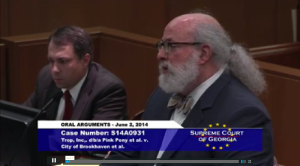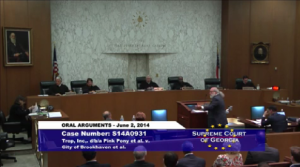Pink Pony, Brookhaven Argue before Georgia Supreme Court
 (APN) ATLANTA — On June 02, 2014, the Supreme Court of Georgia heard oral arguments in the case of the City of Brookhaven v. Trop. Inc. doing business as The Pink Pony, on whether the Pink Pony Adult Club could continue regular business, in light of an ordinance passed just one month after the inception of the City of Brookhaven, disallowing adult clubs to serve alcohol alongside nude dancing.
(APN) ATLANTA — On June 02, 2014, the Supreme Court of Georgia heard oral arguments in the case of the City of Brookhaven v. Trop. Inc. doing business as The Pink Pony, on whether the Pink Pony Adult Club could continue regular business, in light of an ordinance passed just one month after the inception of the City of Brookhaven, disallowing adult clubs to serve alcohol alongside nude dancing.
 “On Jan. 14, 2013, less than a month after Brookhaven incorporated, its new City Council passed the ‘Sexually Oriented Business Code,’ an ordinance that bans consumption of alcohol combined with nude dancing. The Council found that sexually oriented businesses were associated with a wide variety of ‘adverse secondary effects,’ including crime, prostitution, public indecency, illegal drug use and trafficking, [alcohol], urban blight and sexual assault,” according to a summary prepared by Jane Hansen, Public Information Officer for the Supreme Court of Georgia.
“On Jan. 14, 2013, less than a month after Brookhaven incorporated, its new City Council passed the ‘Sexually Oriented Business Code,’ an ordinance that bans consumption of alcohol combined with nude dancing. The Council found that sexually oriented businesses were associated with a wide variety of ‘adverse secondary effects,’ including crime, prostitution, public indecency, illegal drug use and trafficking, [alcohol], urban blight and sexual assault,” according to a summary prepared by Jane Hansen, Public Information Officer for the Supreme Court of Georgia.
In May 2013, the 22 year-old strip club filed a lawsuit against the recently incorporated city in DeKalb County Superior Court.
Pink Pony’s original complaint has “152 paragraphs and 15 counts thoroughly and specifically challenging the incorporation of Brookhaven, the improper enactment and amendments to unconstitutional ordinances, the vesting of rights to continue to operate pursuant to a 2007 contract with DeKalb County, Georgia, and numerous free speech and due process challenges under the Georgia Constitution, as well as challenges to the Brookhaven alcohol, sexually oriented business and zoning ordinances,” according to the summary.
In December 2013, the suit was dismissed out of Superior Court after the City filed a motion to dismiss, and the Superior Court issued a judgment on the pleadings, meaning that discovery did not occur and the judge ruled solely on the complaint, the answer, the motion, and related briefs only.
The Pink Pony then filed an appeal with the Georgia Supreme Court.
“From 1991 to 2001, the Pink Pony and other adult entertainment businesses filed several lawsuits against DeKalb County for enacting ordinances like Brookhaven’s that prohibit total nudity and liquor in adult businesses. Eventually, a number of the establishments entered into a Settlement and Release Agreement with DeKalb County in which the businesses agreed to dismiss pending damages actions in exchange for the right to continue operations,” according to the summary.
“The agreement was extended in 2007 for a minimum of 15 years. The establishments also agreed to pay the County an increased, graduated licensing fee, which for Pink Pony in recent years amounted to $100,000 a year,” according to court documents.
Alan Begner, lead counsel for the Pink Pony, argued to the Georgia Supreme Court that this arrangement, under Article 1 Section 1 Paragraph 2 of the Georgia Constitution, allows for the “Right of Contract” to be fulfilled.
DeKalb Superior Court found that the Code was “constitutional and that the agreement Pink Pony had with DeKalb County violated Georgia Law, Official Code of Georgia § 36-10-3, which states that ‘[o]ne council may not, by an ordinance, bind itself or its successors so as to prevent free legislation in matters of municipal government.’”
The trial court then ruled that the “agreement with DeKalb County did not give Pink Pony any vested right against the City’s Code’ nor the alcohol regulations codes as the strip club could not prove it was ‘injured by that code.’”
If the ordinance is enforced, it would force the Pink Pony to close, at a loss of jobs, and hundreds of thousands of dollars in licensing fees and property taxes. It is worth noting that in almost ten years, the land that the Pink Pony sits on has increased in value 75 percent and there has never been a reported criminal incident at the club in all the years of operation.
DeKalb Superior Court dismissed Pink Pony’s complaint without taking the company’s well-documented materials as true, as is required under Georgia law. When ruling on a motion to dismiss, a Court is supposed to make a determination that, even if everything the Plaintiff alleges is true, that the Plaintiff has no valid legal claim for relief available under the law.
Instead, the trial court applied “the Brookhaven Code of Ordinances to Plaintiffs in an arbitrary and capricious manner, without due process of law, depriving Plaintiffs of their property and the use of their property.”
The trial court also erred by considering as true the attachments to the City’s pleadings, which included unauthenticated copies of affidavits and more than thirty “studies” on the alleged secondary effects of adult businesses in jurisdictions all over the country, Pink Pony argued.
However, the trial court did not consider three exhibits offered by Pink Pony showing there is no correlation between crime and the Pink Pony’s operations.
“In no case has a Georgia court, in granting a motion for judgment on the pleadings, ever considered ‘exhibits’ that are so lacking in indices of reliability as the trial court did here,” Pink Pony argued.
Begner accused the trial court of “rewriting the Civil Practice Act.”
During oral arguments earlier this month, Begner argued, “The City of Brookhaven adopted by reference the DeKalb County code ordinances [when it became a city] and amended some provisions. Some of those amendments came after this complaint was filed.”
“In April, the Brookhaven Board of Zoning Appeals made a ruling for the Pink Pony recognizing that they were a grandfathered in as a nude dancing club under the Brookhaven zoning code,” Begner continued.
In response, Georgia State Supreme Court Justice David Nahmias asked “Isn’t case law clear that your licensing rights are not controlled by your zoning rights?”
“We feel we are zoned for both,” Begner replied.
“The grandfather clause is really a red herring,” Attorney Scott Bergthold for the City of Brookhaven said.
“The City of Brookhaven just recently approved an expansion of an additional 2,700 square feet for the club. This shows that the city is allowing their use to continue. They can have the opportunity to present adult entertainment, subject to the licensing regulations, which are not preemptive and covered by zoning.”
“All the cases dealing with the vested rights issues, all involved someone that was doing something beforehand, that was subject to a later licensing regulation and claimed that their zoning, non-conforming use protected them against that licensing regulation… every one of those cases, this court held, that this was not the case,” Bergthold said.
The City of Brookhaven purports that “In adopting the Code, the City relied on the Georgia Supreme Court’s 1997 decision in Goldrush II v. City of Marietta, which stated that the desire ‘to reduce crime and prevent neighborhood deterioration by separating alcohol from adult entertainment are important government interests unrelated to the suppression of speech.’”
Part of the Pony’s strategy has been to claim that their free speech rights are being violated, by making dancers wear clothes while on stage if the club wants to continue serving alcohol.
“The Georgia Constitution provided more rights to its citizens, like scrutiny, which the U.S. system does not provide,” Begner said.
“We had no chance to contest any of the findings that were before the trial court, like the studies from Michigan and others,” said Begner. “The 11th Circuit ruled in Flannagans vs. Fulton County, that you don’t have to do your own study but you can’t ignore your own study if one is done.”
Bergthold has a history of helping municipalities across the country in fighting strip clubs. There is evidence he is affiliated with a group called American Family Association, listed as a “Hate Group” by the Southern Poverty Law Center (SPLC).
http://firstamendmentlawyers.org/articles/Bergthodl_Cases_and_Ordinances.pdf
“The American Family Association (AFA) is a United States non-profit organization that promotes fundamentalist Christian values. It opposes same-sex marriage, pornography, and abortion. It also takes a position on a variety of other public policy goals and has lobbied against the Employee Free Choice Act. It was founded in 1977 by Donald Wildmon as the National Federation for Decency and is headquartered in Tupelo, Mississippi,” according to Wikipedia.
Ironically, even though Brookhaven is trying to get rid of the Pink Pony now, it may never have been allowed to incorporate under Georgia law without the Pink Pony.
“The proposed map of Brookhaven was drawn to include the Pink Pony, an adult establishment that has operated on Buford Highway since 1991. It offers nude dancing and alcohol and is located just within the southern boundary of the city. Had the cityhood planners wished to eliminate this type of club from the city limits, it could have been accomplished easily at this stage by a small adjustment to the boundary. However, revenue from the Pink Pony played a significant role in the Brookhaven feasibility study estimates by the Carl Vinson Institute. This projected revenue consisted of not only the occupation taxes and alcoholic beverage license fees paid by the Pink Pony, but also ‘anticipated permit revenue from adult-oriented businesses,’” Catherine Bernard, attorney and resident of Brookhaven, wrote in the Brookhaven Post.
According to Bernard, on December 4, 2012, “A Tennessee attorney specializing in ‘adult business law’ began billing the City of Brookhaven for work on a sexually-oriented business ordinance… it was not until December 10 that the elected officials were sworn in and an interim city attorney selected… the authority to hire Scott Bergthold at taxpayer expense did not exist on December fourth.”
The plan to close the Pony, it seems, was being crafted even before the cityhood vote in November 2012, by a few individuals, some who hold city office today. Decisions were being made before a governing body was in place, possibly in secret, some insiders suggest.
The city may have been formed with the express purpose of shutting down the Pink Pony and keeping adult clubs from opening or continuing in any part of the newly formed City of Brookhaven.
In addition, the City is running at a budget deficit. Why is the City of Brookhaven spending hundreds of thousands of taxpayer dollars on this suit? If the city loses, it could pay as much as 20 million dollars in damages once the Pink Pony owner files suit against the City, which he has said he would do.
The City of Brookhaven was a hotly contested city vote and likely for good reason.
Since opening in 1991, the Pink Pony has never been cited for criminal activity. Today, its fate is in the hands of the Georgia Supreme Court.
(END/2014)
Very simple solution: those who disapprove of nude entertainment can stay home. If God did create the human body, those who are beautiful should be appreciated, and voluntary display and expression should be an individual right.